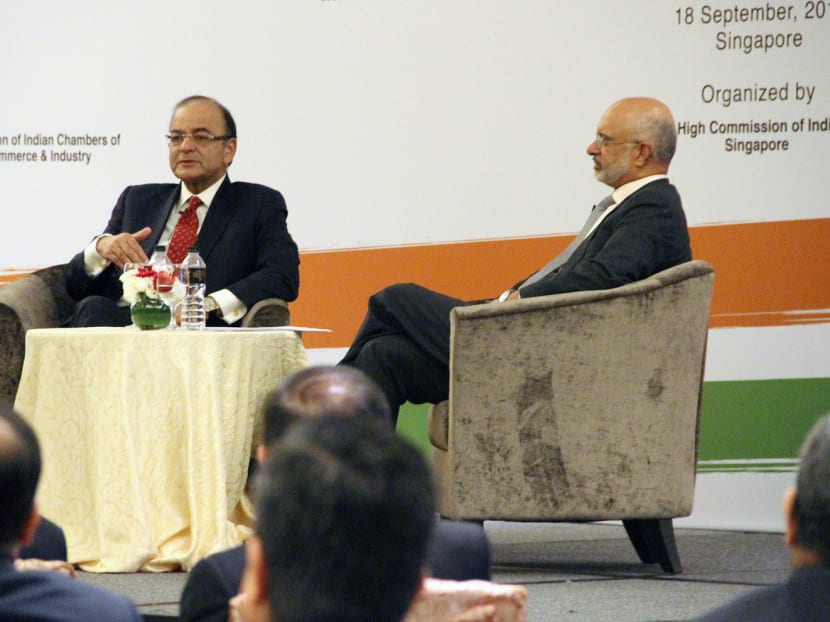India’s Finance Minister calls for stronger business ties with S’pore
SINGAPORE — Indian Finance Minister Arun Jaitley has called for stronger business ties with Singapore, assuring investors that Asia’s third-largest economy is setting its agenda straight on reforms to provide a conducive taxation and foreign investment climate.

Indian Finance Minister Arun Jaitley (left) speaking at the dialogue session yesterday at Marina Bay Sands during his two-day visit in Singapore. Mr Jaitley assured investors here that India was no longer suffering from policy paralysis and an uncertain taxation regime. Photo: Daryl Kang
SINGAPORE — Indian Finance Minister Arun Jaitley has called for stronger business ties with Singapore, assuring investors that Asia’s third-largest economy is setting its agenda straight on reforms to provide a conducive taxation and foreign investment climate.
India is a land of opportunity in globally challenging times, Mr Jaitley said, as he pitched for foreign investment in sectors including infrastructure, manufacturing, and smart cities in India, while deliberating on the global economic slowdown and a need for new business models in a rapidly changing Asian business landscape.
“If you miss out on India now, you will miss out a lot,” Mr Jaitley said at the Marina Bay Sands during a dialogue session organised by the High Commission of India in association with the Federation of Indian Chambers of Commerce and Industry (FICCI) and the Singapore Business Federation.
“We have opened up many sectors including defence, and investment opportunities like those in railways, real estate and infrastructure will turn out to be game changers,” Mr Jaitley said.
Mr Jaitley elaborated on some of the opportunities, citing, among others, more than 400 railway stations and 100 smart city projects being rolled out across the country.
Further, he assured investors here that India was no longer suffering from policy paralysis and an uncertain taxation regime and that its states were now vying to attract investment. The Indian government led by Prime Minister Narendra Modi would continue to focus on making India an attractive investment destination.
Mr Jaitley is here on a two-day visit, during which he is also scheduled to meet Prime Minister Lee Hsien Loong in addition to having bilateral meetings with Deputy Prime Minister and Minister for Finance Tharman Shanmugaratnam and Minister for Foreign Affairs K Shanmugam. Mr Jaitley will also meet investors and fund managers in Singapore, including Temasek and GIC.
From Singapore, he will proceed to Hong Kong, where he will also spend two days meeting top leaders and investors.
Singapore and India marked its 50th year of diplomatic relations this year, with President Tony Tan Keng Yam making a state visit to India in February.
Since the early 1990s, Singaporean companies have been active in India’s equity market as foreign institutional investors, and the trend has gathered momentum in recent years.
Singapore was the largest source of foreign direct investment (FDI) into India from 2013 to 2014, overtaking Mauritius, with US$5.98 billion (S$8.33 billion) and accounting for about 25 per cent of FDI inflows during the period, said the High Commission of India in Singapore.
Banking, pharmaceuticals, telecommunications and information technology were the focus of such portfolio investments, besides investments in ports, airports and infrastructure projects.
Indian Prime Minister Modi will visit Singapore in November on an official visit during which, Prime Minister Lee recently said, the ties between the two countries will be elevated to a strategic partnership.
Amid a global slowdown and financial turmoil in China, India appears to be standing out as the fastest growing major economy driven by strong macroeconomic fundamentals.
Although the Indian economy slowed at a faster-than-expected pace to 7 per cent in the quarter to June, its government is aiming for annual economic growth rates of 8 to 10 per cent through a raft of supply-side measures that would increase India’s ability to grow and avoid a demand-driven boom and bust cycle.
The government of India has ramped up public investment by 40 per cent this year, as part of Prime Minister Modi’s drive to modernise roads and railways.
India is also planning to lift the cap on equity investments made by the main US$100 billion state pension fund, to 15 per cent from 5 per cent, in a bid to stabilise domestic equity markets by allowing greater investment by long-term funds. With agencies





